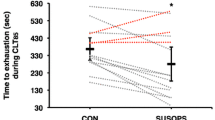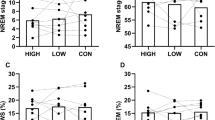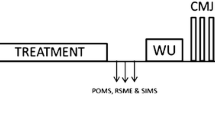Abstract
Isokinetic leg strength and fatigue were measured in 24 male U.S. Marine Corps volunteers in a simulated sleep loss and unusually heavy work scenario. Knee extension and flexion peak torque (PT) were measured at three isokinetic speeds (1.57, 2.62 and 3.66 rad·s−1) followed by 45 consecutive maximal reciprocal contractions at 3.14 rad·s−1 to measure fatigue index (FI). All subjects were retested 2 days later following 30-h sleep deprivation (SD). The exercise group (n = 12) spent 25 1-h sessions performing computer tasks, filling out questionnaires and walked 1.61 km with a 50% gross body mass pack load, during each of the 25 sessions. The control group (n = 12) did likewise but did not exercise. Repeated measures ANOVA indicated that flexion PT at 1.57 rad·s−1 decreases (P < 0.013) after SD. Exercise did not affect Fl but did decrease PT. It was concluded that carrying a 50% load produces decrements in PT for both extension and flexion but more so for flexion. SD affected PT but had no effect on FI.
Similar content being viewed by others
References
Armstrong RB (1984) Mechanisms of exercise-induced delayed onset muscular soreness: a brief review. Med Sci Sports Exerc 16: 529–538
Armstrong RB, Ogilvie RW, Schwane JA (1983) Eccentric exerciseinduced injury to rat skeletal muscle. J Appl Physiol 54:80–93
Barnes WS (1981) Isokinetic fatigue curves at different contractile velocities. Arch Phys Med Rehabil 62:66–69
Bond V, Kresham K, Balkissoon B, Tuckson L, Caprarola M, Johnson D, Bartley D (1988) Effects of sleep deprivation on muscle function during an isokinetic contraction. J Sports Med 28:1–6
Clarkson PM, Tremblay I (1988) Exercise-induced muscle damage, repair, and adaptation in humans. J Appl Physiol 65:1–6
Griffith PG (1966) Serum-levels of ATP: creatine-phosphotransferase (creatine-kinase). The normal range and effect of muscular activity. Clin Chim Acta 13:413–420
Hortobagyi T, Denaha T (1989) Variability in creatine kinase: methodological, exercise, and clinically related factors. Int J Sports Med 10:69–80
Ikai M, Steinhaus AH (1961) Some factors modifying the expression of human strength. J Appl Physiol 16:157–163
Legg SJ, Patton JF (1987) Effects of sustained manual work and partial sleep deprivation on muscular strength and endurance. Eur J Appl Physiol 56:64–68
Lynch P, Bakal DA, Whitelaw W, Fung T (1991) Chest muscle activity and panic anxiety: a preliminary investigation. Psychom Med 53:80–89
Martin BJ (1981) Effect of sleep deprivation on tolerance of prolonged exercise. Eur J Appl Physiol 47:345–354
Martin BJ (1988) Sleep loss and subsequent exercise performance. Acta Physiol Scand 133 [suppl] 574:28–32
Mawdsley RH, Knapik JJ (1982) Comparison of isokinetic measurements with test repetitions. Phys Ther 62:169–172
Osternig LR (1986) Isokinetic dynamometry: implications for muscle testing and rehabilitation. Exerc Sports Sci Rev 14:45–80
Plyley MJ, Shephard RJ, Davis GM, Goode RC (1987) Sleep deprivation and cardiorespiratory function. Eur J Appl Physiol 56:338–344
Rosalski SB (1967) An improved procedure for serum creatine phosphokinase determination. J Lab Clin Med 69:696–705
Symons JD, Vanhelder T, Myles WS (1988) Physical performance and physiological responses following 60 hours of sleep deprivation. Med Sci Sports Exerc 20:374–380
Takeuchi L, Davis GM, Plyley M, Goode R, Shephard RJ (1985) Sleep deprivation, chronic exercise and muscular performance. Ergonomics 28:591–601
Thorstensson A, Karlsson J (1976) Fatiguability and fibre composition of human skeletal muscle. Acta Physiol Scand 98: 318–322
Thorstensson A, Grimby G, Karlsson J (1976) Force-velocity relations and fiber composition in human knee extensor muscles. J Appl Physiol 40:12–16
Vanhelder T, Rodomski MW (1989) Sleep deprivation and the effect on exercise performance. Sports Med 7:235–247
Wacker WEC, Ulmer DD, Vallee BL (1956) Metalloenzymes and myocardial infarction. N Engl J Med 255:449–455
Yeager JE, Chrisman RP, Sucec AA (1987) The effect of sleep deprivation and moderate intermittent exercise on maximal aerobic capacity. Technical Report No.86-36. Naval Health Research Center San Diego, Calif.
Author information
Authors and Affiliations
Rights and permissions
About this article
Cite this article
Bulbulian, R., Heaney, J.H., Leake, C.N. et al. The effect of sleep deprivation and exercise load on isokinetic leg strength and endurance. Europ. J. Appl. Physiol. 73, 273–277 (1996). https://doi.org/10.1007/BF02425487
Accepted:
Issue Date:
DOI: https://doi.org/10.1007/BF02425487




